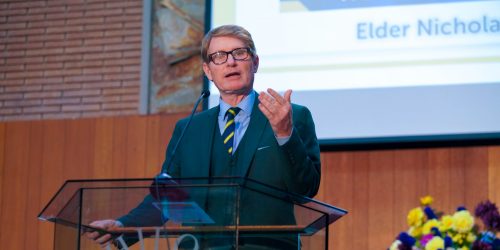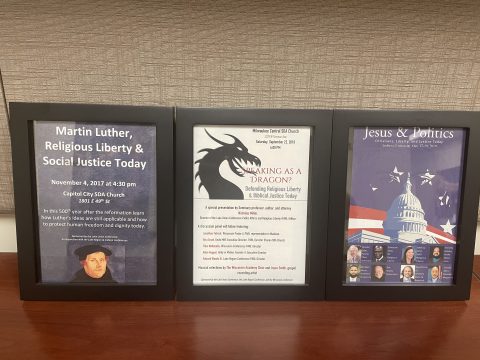
Nicholas Miller speaking at his last public event as Lake Union Public Affairs and Religious Liberty director on Aug. 13. Photo Credit: Jean Michel
I will continue to provide general legal support, both for the PARL Department, and the Union as a whole, until other legal counsel can be arranged. I am continuing my half-time faculty role at Andrews University in the church history department at the Seminary, but will do so from the Washington, D.C. area.
I will teach some classes at Washington Adventist University for Seminary students, other classes virtually, and will return to Berrien from time to time to teach intensives and summer sessions. The goal is to help create opportunities for Seminary students who are interested in public affairs and social issues ministry to have access to the riches of the DC area, whether it be Capitol Hill and Congress, Church headquarters and leaders, and the many institutions of social and cultural leadership. I am also going to be working with the WAU honors and pre-law program, as well as with their Center for Law and Public Policy, to complement the efforts of the Andrews University International Religious Liberty Institute that I direct.
Along with my teaching responsibilities, I will be working with a group of Christian lawyers to help protect and defend religious liberty, especially for religious institutions like universities, colleges and hospitals. It should be a busy enough life!
In my role at the Union, I have had a special opportunity to build bridges between academy and the church on the best of developing thought on issues of both religious freedom and social issues from an Adventist prophetic view. We have been able to partner with both our local conferences and churches, as well as the Lake Union Communications Department, to amplify this message into the churches and institutions of our Union, as well as to other Unions throughout our Division, and indeed even overseas.
I began my tenure at the Lake Union with a major PARL rally in Chicago under Elder Don Livesay, and ended it with a major PARL rally in the middle of August, at which Pastor Dwight Nelson was the main speaker. At that event we had a panel of PARL Directors and leaders from across the NAD present on a range of issues, showing the new diversity of topics the PARL Department is engaging. Items addressed included issues of racial and social justice, to conscience and vaccines, to prayer in schools, as well as our traditional concerns about Sabbath accommodation and religious freedom.
In between these events, we had rallies at all the major cities of our Union, including Indianapolis, Detroit, and Milwaukee, as well as a number of other places. We also had a number of other events at Andrews University in Berrien Springs, including a major conference on “Jesus and Politics,” exploring how our understanding of the gospel and prophecy should cause us to engage major social and even political issues of our day.
At the start of the pandemic, we partnered with the Communication Department to run a major Zoom webinar once a week on Sabbath for the first ten weeks of the lockdown. I believe this was helpful to many church members (including ourselves!) to have some sense of connection and calm during an increasingly surreal and anxious time. We were able to address a range of issues, including the prophetic and theological meanings of the pandemic, how to stay well and healthy with natural remedies, as well as questions of religious freedom and conscience.
After that initial blitz, we transitioned to having the webinars about every month or so. We continued these discussions as the protests and confrontations broke out in our streets surrounding the topics of race and police power. It was truly a privilege to help the church speak out in relation to the pressing issues of the day, showing how our prophetic views are not just an escape hatch from worldly problems, but could help us speak and act on behalf of the justice and righteousness taught by the biblical prophets, as well as by Jesus himself.
We have also continued to fulfill the traditional PARL functions of helping our members with both Sabbath work issues, as well as Union membership and non-combatancy letters. We have also sought to help our members on both sides of the vaccine question. The church’s official position is to encourage our members to avail themselves of the protections of the vaccine. We believe that if the church opposed important health measures on the grounds of religious liberty, we would actually do damage to religious liberty arguments generally. But we also acknowledged that some church members have personal convictions against taking it. At the Lake Union we drafted a model letter for such persons to send explaining their personal beliefs, and this letter was adopted by many of the other Unions in the North American Division for their members.

I hope that we have been able to remind our members of the broader view of Public Affairs and Religious Liberty that our Adventist Pioneers held in the 19th century. They were concerned about prophesied and proposed Sunday laws, but they also had a much wider field of concern. They viewed issues of slavery, racism, abuse of women and children, especially in relation to alcohol use, as having directly prophetic implications. They were opposed to participation in partisan politics, but they were fully engaged in something we might call moral politics—where issues of basic morality were being contested in the public square and even in courts or legislatures. They were not silent on the great moral questions of their day, whether it be calling for abolition of slavery (the mostly hotly contested political issue of the day), operating stops on the underground railway, and opposing the fugitive slave law (thereby engaging not just in social and civil protest, but one of the most extreme forms of it, civil disobedience.)
Their calls for social justice and righteousness did not end when slavery ended, but they continued to critique the racism and oppression that came with reconstruction, operating schools to educate freed slaves, where custom, convention, and even law were against it. They would critique, in the pages of the Review and Liberty magazine (or its equivalent) abuses by the American government when it came to militarism and imperialism, especially when it came to the Spanish American war. They critiqued white supremacy before it was even known by that name, pointing out the pretensions of Anglo-Saxon superiority as part of what drove what they viewed as the unjust war in the Philippines. They also embraced the wisdom that came from the burgeoning field of science, speaking not one word against the Supreme Court decisions upholding vaccine requirements. On the contrary, they promoted those vaccines that were shown by science to be efficacious, recommending and even requiring church workers who traveled overseas to comply with state-required vaccine regimens.
Many so-called conservatives of our day who laud Ellen White and the pioneers would find themselves on very much the other side of many social and moral issues from them, should they be alive today. The conservatism that is embraced by some today is that of evangelical fundamentalism that was suspicious of science and higher education and was socially conservative (especially on issues of race and gender), that intruded into our church in the 1920s and 30s after the death of Ellen White, and not the actual biblical faithfulness of our pioneers.
Still, a church given to principles of religious and civil freedoms should find within itself (and Christ, Who is in our midst) the resources of care, respect, and toleration to love those that disagree with us on these matters, even in the church, which can sometimes be the hardest. As the proverb goes, “Oh, to be in heaven with the saints, that will be glory, but to be with the saints below, that is another story!” But this is where we show the love of Christ to be actually real and efficacious, and with power to help us care for and love whoever we may differ with. True love does not always display itself in “niceness” or “kindness,” as the world views it. Sometimes love calls for accountability and consequences, but even that needs to be done in the spirit of respect and genuine care. I pray that will be at least part of the legacy I leave here.
Debbie Michel is the Lake Union Conference Communication director and Lake Union Herald editor.